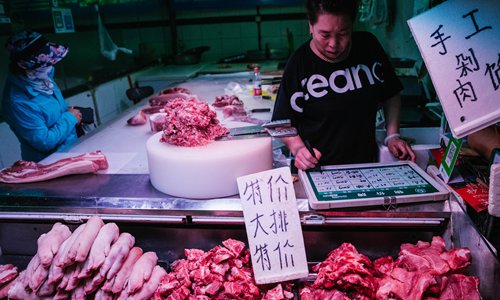China’s CPI up 2.8% in August, driven by food prices
China’s CPI up2.8% in August, driven by food prices

A pork stall in Beijing on Wednesday Photo: Li Hao/GT
China's consumer price index (CPI), a main gauge of inflation, rose 2.8 percent year-on-year in August, marking the sixth consecutive month that the CPI went above 2 percent. This was fueled by a rise in food prices and in particular the price of pork due to African swine fever (ASF).
The index is unchanged from July readings, but is slightly higher than the market expectation of 2.7 percent, data from the National Bureau of Statistics (NBS) showed on Tuesday. In July, China's CPI grew 2.8 percent, hitting a 17-month high.
Surges in food prices including the price of pork have become a key driver behind the uptick in the August CPI. Pork prices soared 46.7 percent in August year-on-year, accelerating 19.7 percentage points from July.
Food prices rose 10 percent year-on-year in August, 0.9 percentage points higher than in July, which pushed CPI 1.93 percentage points higher. Non-food prices grew 1.1 percent year-on-year in August, 0.2 percentage points lower than the July number, driving up CPI gains by 0.91 percentage points.
The upcoming holidays, including the Mid-Autumn Festival and the National Day holidays, could continue to drive up demands for food prices. But analysts forecast that in the short term, China's consumer price will remain stable under a bunch of government measures to stabilize pork price, such as releasing frozen pork and providing subsidies to pork farmers.
"In the long-term, the pork price is under pressure as it may take time to breed and raise hogs," Wang Jun, a deputy director of the department of information at the China Center for International Economic Exchanges, told the Global Times. But as non-food prices continue to ease, China's CPI will remain stable for the rest of the year.
China's producer price index, a gauge of corporate profitability, declined 0.8 percent year-on-year amid a boiling China-US trade war, NBS data showed.
